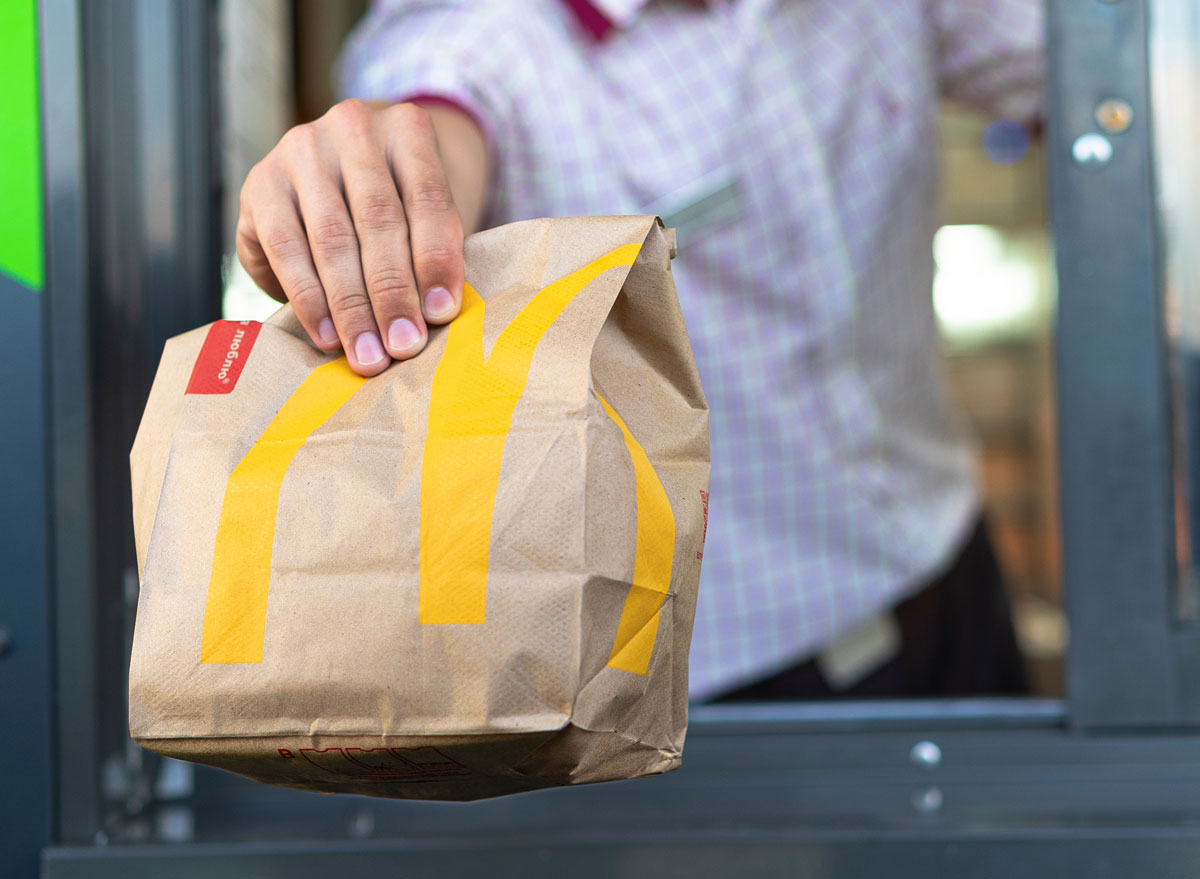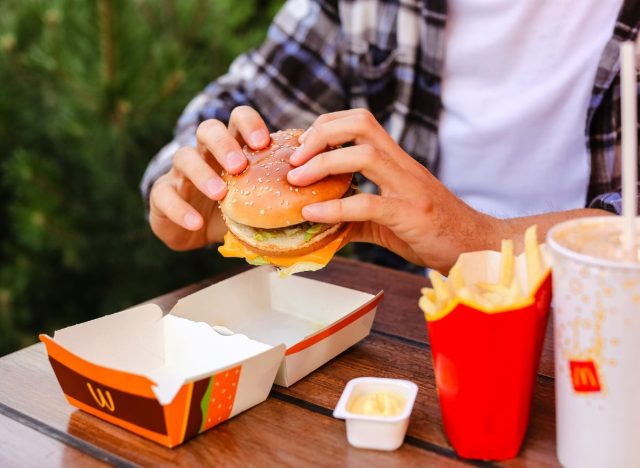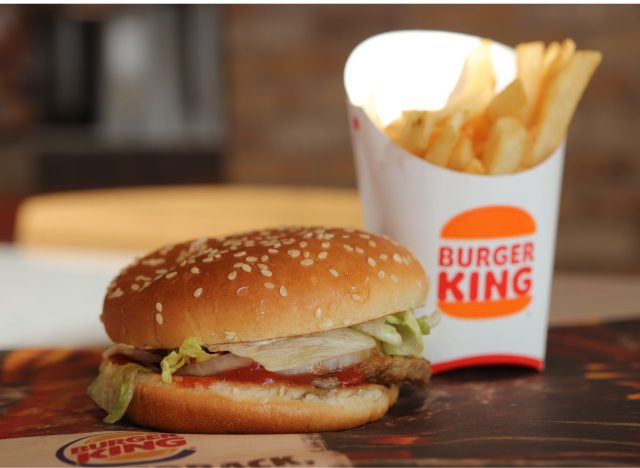4 Fast-Food Chains Dietitians Avoid at All Costs

Sometimes, fast food is the answer. Need a meal that you can grab on the go during the lunch rush? Haven’t had time to cook breakfast but know you need to eat something before heading into the office? Low on cash today but just don’t have the energy to cook something tonight? In these cases, swinging by the drive-thru of your favorite fast-food chain can be the best solution. However, when it comes to nutrition, fast food is usually not the best choice, and there are certain chains that some dietitians suggest steering clear of completely.
In the general sense, regular fast food consumption as a whole has been linked to an increased risk of various issues like cardiovascular disease, type 2 diabetes, high cholesterol, and hypertension. These risks are largely due to the high levels of sodium, saturated fat, trans fat, and calories in fast food. However, certain chains carry healthier alternatives and may have better choices than others when it comes to nutrition. For example, you can find lighter options at fast-food chains like Chick-fil-A, Chipotle, or Panera.
On the flip side, some fast-food restaurants don’t offer much at all in terms of nutrition, and some use concerning ingredients or have scarily high levels of sodium, fat, and calories. The following list consists of four popular fast-food joints that some registered dietitians stay away from, as well as their reasons behind this decision. Read on, and for more healthy dining out tips, check out the 9 Healthiest Fast-Food Burritos to Order Right Now.
McDonald’s

Since its beginnings in 1955 in Des Plaines, Illinois, McDonald’s has become one of the most popular fast-food chains across the world. Now with over 40,000 locations worldwide, this mega chain is here to stay. However, with its decade-long history, it’s no surprise that this fast-food restaurant has had its fair share of unhealthy menu items—think BLT Quarter Pounder, the Classic Big Mac, or the discontinued Grand Mac—which have left some people skeptical if this chain is worth visiting.
Even though McDonald’s has taken certain strides to be seen in a better light, like ditching the “pink slime meat by-product” that they used to use in their burgers up until 2011, many people still avoid this fast-food chain when they can—including some of our dietitians.
“McDonald’s uses highly processed ingredients in many of their menu items, such as […] preservatives and additives,” says Lisa Young, PhD, RDN. “For example, their chicken nuggets contain several synthetic ingredients.” The ingredients that Young is referring to are listed on the McDonald’s website, which include hydrogenated soybean oil, modified corn, calcium lactate, and yeast extract, to name a few.
Not only that, but most of the menu items at McDonald’s are high in calories, sodium, and saturated fats, which is why Young steers clear of this chain. “I tend to avoid McDonald’s, as most menu items are fried and processed, thus negatively impacting my health,” she says.
Burger King

The second largest fast-food burger chain in the world, Burger King is serving up Whoppers to over 19,000 locations across the globe. Burger King has gained an enormous following since its start in 1954, and it made history in recent years with its release of the Impossible Whopper: a fully plant-based take on their famous Whopper sandwich.
Even though having a plant-based burger makes this fast-food joint more accessible to different dietary needs, some dietitians still choose to opt out of visiting BK.
“Some of [Burger King’s] burgers and meals can be extremely high in calories, which can contribute to weight gain and related health issues,” says Mary Sabat MS, RDN, LD.
Young agrees, saying that her main reason for avoiding Burger King is that “their meals are high in calories, cholesterol, saturated fats, and sodium, and unhealthy fats present are associated with increasing LDL cholesterol (bad cholesterol) and poor heart health.” She adds that many of their portions are extremely large, “which may contribute to weight gain and excess calorie intake.”
Checkers & Rally’s

To some, it’s Checkers, to others, it’s Rally’s. Any slight confusion usually stems from the fact that in 1999, Checker’s acquired Rally’s but kept the Rally’s branding, and now both fast-food brands have the same menu items and are provided by the same distributors—meaning it’s both Checkers and Rally’s that serve up those famous seasoned French fries. However you choose to call it, this chain is avoided by some dietitians because of the lack of nutritional value and sneaky ingredients lurking behind their beloved menu items.
“As a registered dietitian, I would advise avoiding Checkers for several reasons,” says Trista Best, MPH, RD, LD at Balance One Supplements. “First and foremost, their menu is known for being high in saturated fats, trans fats, and overall unhealthy fats, which can contribute to heart disease and other chronic health conditions when consumed regularly.” She adds that “Many menu items are deep-fried, leading to excessive calorie and fat content.”
Let’s look at their Triple Smoky BBQ Bacon Buford Burger, for instance. In one burger you’ll get 105 grams of fat, 35 grams of saturated fat, and two grams of trans fats.
Best also notes that along with unhealthy fats, “Most of their offerings are often loaded with sodium, which can raise blood pressure and increase the risk of cardiovascular problems, and excessive sodium intake is a concern for those with hypertension and can lead to water retention and bloating.” Looking at the same BBQ Bacon Buford Burger, you’ll get 2,500 milligrams of sodium in the sandwich alone, before even adding fries.
Lastly, Best notes that “Checkers meals are typically lacking in essential nutrients like fiber, vitamins, and minerals while being high in empty calories. This can lead to overconsumption of calories without satisfying nutritional needs, potentially contributing to weight gain and nutrient deficiencies.”
KFC

KFC is America’s first fast-food chicken chain, beginning on the side of a Kentucky highway in the 1930s, and it has now become one of the most profitable fast-food chains in the world. Despite its popularity, some dietitians suggest going elsewhere when it’s fried chicken you’re craving.
“This fast-food chain is known for its fried chicken, which is high in fat due to the deep-frying process,” says Sabat. “The oil they use is a combination of canola, which is a [genetically modified] food, and hydrogenated soybean oil, which is both a [genetically modified] food and a [source of] trans fat.” She adds that “Consuming high levels of trans fat can increase the risk of heart disease, stroke and inflammation.” It’s worth noting that trans fat intake of the American population has drastically decreased since partially hydrogenated oils were banned from the U.S. food supply, but certain fast food items still contain small amounts of these heart-harming fats, which can add up if these food products are eaten frequently.
Sabat also notes that “The breading and seasoning used in KFC’s chicken can be high in sodium, contributing to overall sodium intake.” For instance, in just one KFC Fried Chicken Breast, you’re getting 1,190 milligrams of sodium, more than half of the recommended daily maximum, and that’s before you’ve consumed any side items at all. “Also, some of KFC’s side dishes, like their mashed potatoes and gravy, can contain artificial flavors, preservatives, and additives,” says Sabat.









